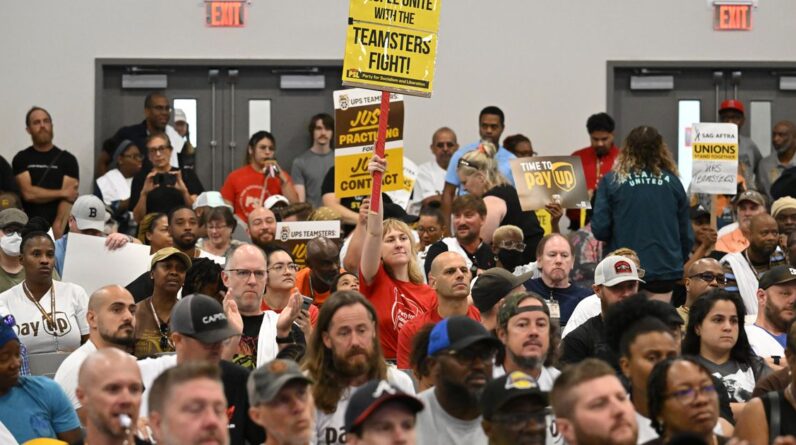
Sandy Springs-based UPS and the International Brotherhood of Teamsters have reached an agreement on a new labor contract to avoid a mass strike.
The two sides announced the tentative agreement for a new five-year contract on Monday, just one week before the union’s strike deadline.
The Teamsters union said the new contract agreement includes higher wages, more full-time jobs and job protections.
“Grassroots UPS Teamsters sacrificed everything to get this country through a pandemic and allowed UPS to make record profits,” Teamsters General President Sean O’Brien said in a written statement. “UPS has put $30 billion in new money on the table as a direct result of these negotiations.”
UPS CEO Carol Tomé issued a statement saying, “Together we have reached a win-win agreement on the issues that are important to Teamsters leadership, our employees and UPS and our customers.”
“This agreement continues to reward UPS full- and part-time employees with industry-leading wages and benefits while preserving the flexibility we need to stay competitive, serve our customers and keep our business strong,” Tomé said.
The Teamsters labor contract runs through July 31, and the union had threatened to strike on Aug. 1 if it didn’t have a new contract agreement by then.
Teamsters General Secretary and Treasurer Fred Zuckerman said in a written statement that UPS “came perilously close” to a strike, “but we stood firm on our demands.”
The Teamsters have more than 340,000 members at UPS, making it the largest private collective agreement in North America. A strike would have crippled shipping nationwide, affecting millions of deliveries a day and damaging UPS’s reputation with customers.
The next step is for the union’s 176 local leaders to meet on July 31 to review the tentative agreement. If he recommends it for a ratification vote, UPS rank-and-file members will vote on the deal Aug. 3-22.
O’Brien has worked to maintain unity among members in UPS negotiations, after past years in which the Teamsters had split into factions.
The Teamsters union had previously announced tentative agreements on a number of terms during negotiations that began in April, including equipping new trucks with air conditioning, ending a two-tier pay system, ending mandatory overtime on a day they are not scheduled to work and establishing Martin Luther King Jr. Day. as a full holiday.
Last month, union members voted to authorize a strike if negotiations failed to reach an agreement. Union leaders then stepped up pressure on negotiations and pushed for faster progress in the talks.
UPS has been losing some business to competitors, including FedEx, as customers worried about how their goods would move if there was a strike.
UPS CEO Carol Tomé also said in April that the company had a portfolio of potential business worth more than $6 billion, but that it was “difficult to sell … because of this negotiation with the Teamsters.”
“But we’re going to do it hard when we have the handshake agreement,” Tomé said. “We must win faster, and we will win faster when the uncertainty is behind us” of the Teamsters negotiations.
[ad_2]
Source link





